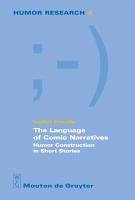
The Language of Comic Narratives (eBook, PDF)
Humor Construction in Short Stories
Versandkostenfrei!
Sofort per Download lieferbar
160,95 €
inkl. MwSt.
Weitere Ausgaben:

PAYBACK Punkte
80 °P sammeln!
The book offers a comprehensive account of how humor works in short stories, by presenting a model of narrative comedy that is pragmatically as well as semantically, grammatically and stylistically informed. It is the first study to combine a sequential analysis of the comic short story with a hierarchical one, merging together horizontal and vertical narratological perspectives in a systematic way. The book covers the main areas of linguistic analysis and is deliberately interdisciplinary, using input from philosophy, sociology and psychology so as to touch upon the nature, motivations and fu...
The book offers a comprehensive account of how humor works in short stories, by presenting a model of narrative comedy that is pragmatically as well as semantically, grammatically and stylistically informed. It is the first study to combine a sequential analysis of the comic short story with a hierarchical one, merging together horizontal and vertical narratological perspectives in a systematic way. The book covers the main areas of linguistic analysis and is deliberately interdisciplinary, using input from philosophy, sociology and psychology so as to touch upon the nature, motivations and functions of humor as a cognitive phenomenon in a social context. Crucially, The Language of Comic Narratives combines a scholarly approach with a careful explanation of key terms and concepts, making it accessible to researchers and students, as well as non-specialists. Moreover, it reviews a broad range of historical critical data by examining the source texts, and it provides many humorous examples, from jokes to extracts from comic narratives. Thus, it seeks to anchor theory in specific texts, and also to show that many linguistic mechanisms of humor are common to jokes and longer, literary comic narratives. The book tests the model of humorous narratives on a set of comic short stories by British and American writers, ranging from Evelyn Waugh and Dorothy Parker, through Graham Greene and Corey Ford, to David Lodge and Woody Allen. The validity of the model is confirmed through a subsequent discussion of apparent counter-examples.
Dieser Download kann aus rechtlichen Gründen nur mit Rechnungsadresse in A, B, BG, CY, CZ, D, DK, EW, E, FIN, F, GR, HR, H, IRL, I, LT, L, LR, M, NL, PL, P, R, S, SLO, SK ausgeliefert werden.



